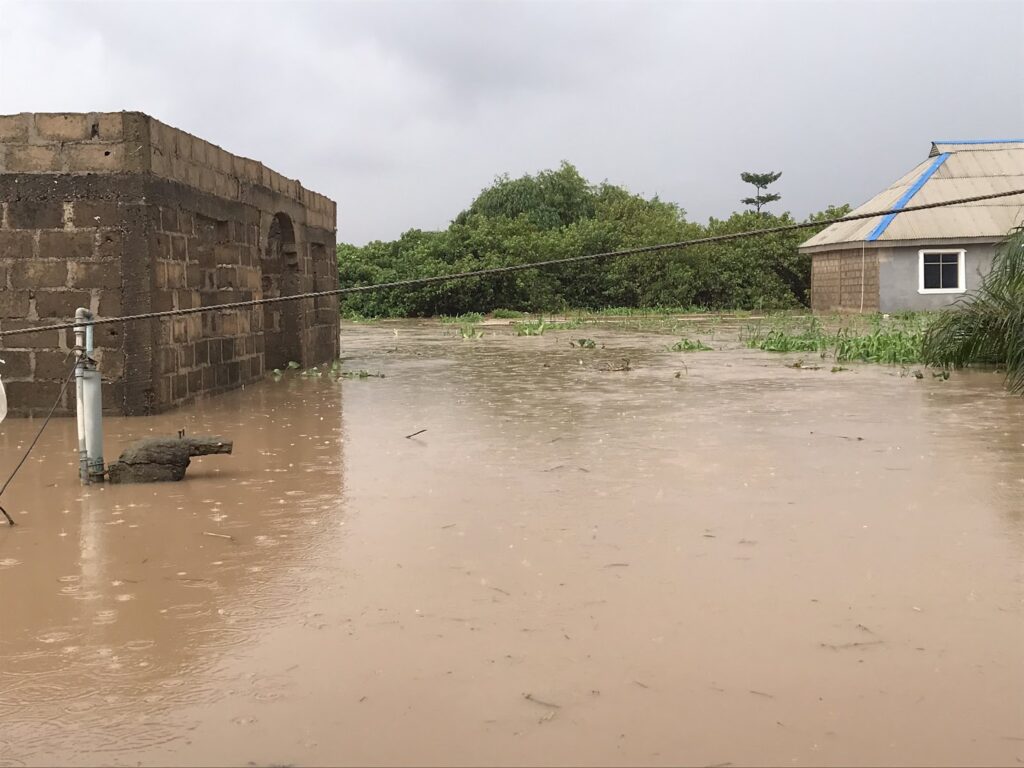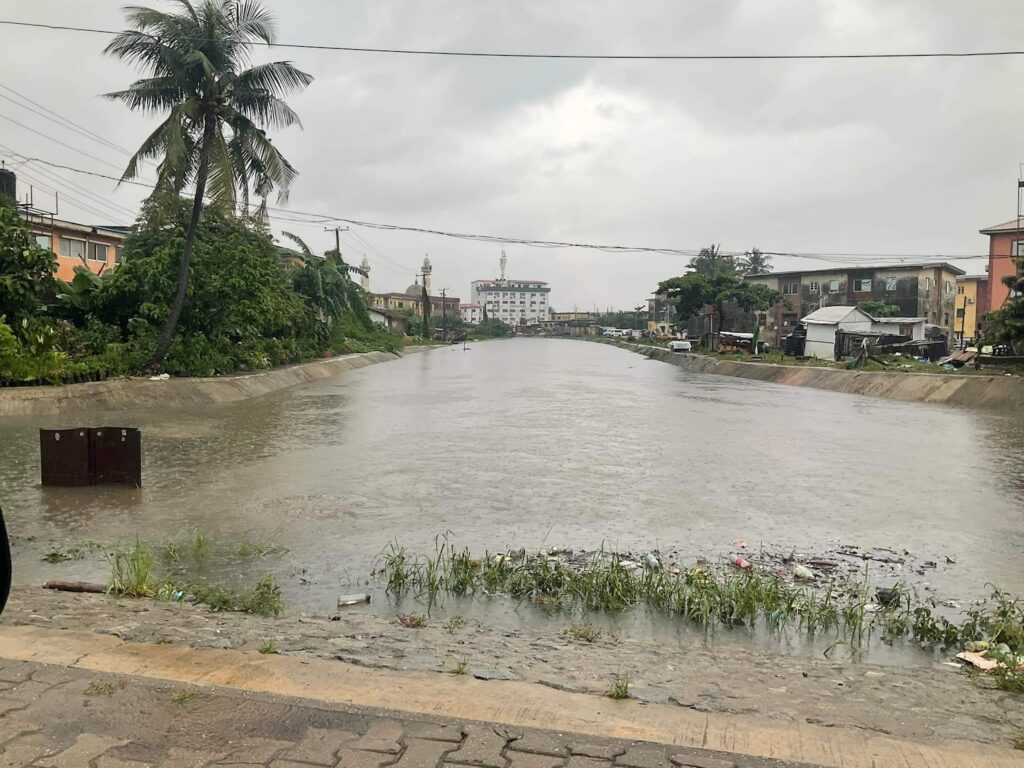Lagos Floods: Victims Face Homelessness, Loss Of Property, Death
Rainfall wreaked havoc on residents and property with attendant loss of lives across Lagos, Southwest Nigeria.

It was a black weekend for many residents of Lagos state, as rainfall wreaked havoc. The rain, which lasted for three days, between July 8 and 10, left the state heavily flooded and swept some residents to their death.
Some of the worst affected areas include Agege, Lekki, Ajah, Victoria Island, Ifako, Oworo, Ogudu, Ayobo, Gbagada, Iyana-Ipaja, and Ebutte Metta.
According to the National Emergency Management Agency (NEMA), the flooding led to the death of seven people. Aside from those killed, other residents lamented losing property worth millions of naira to the disaster.
Femi Adeyemi, a resident of Ajah, while speaking with HumAngle, said he had travelled out of town for the Eid-il-Kabir festival when he got calls from his neighbours that the flood had damaged many of his properties.
Even after returning on Tuesday, July 12, he could not access his home as water had blocked the access road in Silverpoint Estate, Badore. Adeyemi is frustrated that the flood that displaced him from his house in 2020 has now returned even though he is yet to recover from the previous loss.
“The first time I became a victim of flood was in 2020. I had to run out of the house with my wife and son. The flood carried all my valuables and it has returned this year again. I cannot sleep in that room any longer.
“My generator, freezer, chairs, clothes, and all the properties are gone. I have been informed by other neighbours that the landlord of the house ran away as well. I had some money in the wardrobe but it’s all gone.”
Asked why he did not look for another house after his experience two years ago, Adeyemi replied that he had nowhere to go. “My wife is currently with her sibling while I stay in a wooden shop with a friend that was also displaced from his house as a result of the flood.”
Lagos’ vulnerability to intense rainfall and water overflow is associated with numerous factors, including a low-lying coastal geographical feature and weak flood control infrastructure.
The inability of the city’s wetland systems and Lagoon to serve as a sponge for runoff water as well as the conversion of wetlands for housing units are also contributing to the perennial flood crisis that disrupts socio-economic activities.

Aside from causing low crop yields and food shortages, constant flooding in Nigeria has also led to the displacement of people. In 2019, floods affected approximately 200,000 people and 158 deaths were recorded. NEMA said no fewer than 129,000 persons were affected the following year and at least 69 lost their lives in flood disasters.
Many were also affected in 2021. “More extreme flooding must be expected, and for the towns and cities where flooding has already occured, theirs will no longer be a ‘once in a lifetime’ risk but now far more frequent,” notes the United Nations Environment Programme (UNEP).
Aside from Adeyemi, who is now finding life difficult in Ajah, many sustained injuries while trying to save their properties from destruction.

A victim, Jadesola Taiwo, fell and injured her hand while she was trying to save her property. She is presently receiving treatment at a trado-medical centre in the Sangotedo area.
“I feel pain that, despite sustaining injuries, I could not save my properties. I can no longer have access to my storey building apartment where I stayed on the ground floor. The flood took away all of my belongings and further made me homeless,” she said bitterly.
A resident of Victoria Island who simply identified herself as Titi said, “My car, alongside all the other cars in the neighbourhood, got completely damaged. The car was soaked to the roof. I ran out of the room with my shorts when I realised the water was already entering with full force. I need people’s help at this time.”
The Lagos State Government had, in March, predicted a high-intensity annual rainfall amount of 1,750mm with attendant socio-economic implications for residents. The government, however, allayed fears saying arrangements had been put in place to ensure adequate protection of lives and property with expected flash flooding across the state.
Reacting to the latest disaster, Joe Igbokwe, Special Adviser on Drainage and Water Resources to the governor, wrote an open apology to Lagosians, arguing that the flood could not be disconnected from the fact that Lagos was a coastal city.
“We acknowledge the damage done by flood in Lagos yesterday and the losses. We apologise most sincerely for the pains and tears. We share the pains with those affected. Lagos is a coastal city that is prone to flooding. Everybody knows this. Lagos has the smallest land mass in Nigeria with 23 million Nigerians,” his statement read.
“We have wetlands which serve as reservoirs to retain excess floods but Lagosians will defy the law and go there to build houses. To make matters worse, some Lagosians dump refuse inside our drains or canals. Some build houses on our canal setbacks making it difficult, if not impossible, for us to clear the drains. We need to change our habits to help us have flood-free Lagos. Lagos spends huge amounts of money every year cleaning canals and aligning many of them with concrete.”
He added that flooding is experienced across the world because of climate change and will reduce if residents comply with laid-down regulations.

Adaku Jane Echendu, a climate expert at Queen’s University, Ontario, recommends the incorporation of spatial planning into flood risk management as the way to go.
“Sustainable urban planning and green infrastructure could also be combined with information and communication technology tools,” she observed. “Citizens can use these to communicate with the relevant authorities at the onset of flooding. The human-induced causes of flooding should be addressed urgently. Not doing this will delay its journey to sustainable development.”
Also, Sako Kato, a climatologist and lecturer at the University of Abuja, earlier told HumAngle that building sustainable communities, robust flood management infrastructure, and strengthening the implementation of environmental laws are essential to curb the indiscriminate destruction of natural systems.
“Wetlands serve as transitional zones between the city area and the nearby water bodies. They are to be protected just like conservative green areas and the government and local authorities must restrict most forms of interference that might alter the state of the wetlands.”
Support Our Journalism
There are millions of ordinary people affected by conflict in Africa whose stories are missing in the mainstream media. HumAngle is determined to tell those challenging and under-reported stories, hoping that the people impacted by these conflicts will find the safety and security they deserve.
To ensure that we continue to provide public service coverage, we have a small favour to ask you. We want you to be part of our journalistic endeavour by contributing a token to us.
Your donation will further promote a robust, free, and independent media.
Donate HereStay Closer To The Stories That Matter




